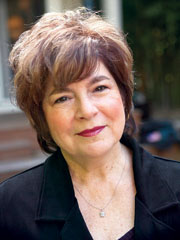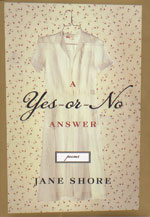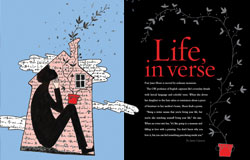Life, in verse
Poet Jane Shore is moved by ordinary moments.
The GW professor of English captures life’s everyday details with lyrical language and colorful verse. When she drives her daughter to the hair salon or reminisces about a piece of furniture in her mother’s home, Shore finds a poem.
“Being a writer means that you’re living your life, but you’re also watching yourself living your life,” she says. When an event stirs her, “it’s like going to a museum and falling in love with a painting. You don’t know why you love it, but you can feel something percolating inside you.”
For more than three decades, Shore has transformed those palpitations into print. A prize-winning author and a professor at GW since 1989, Shore creates poetry that is accessible, carefully constructed, and almost always deeply personal. In 2008, she published her newest collection, A Yes-or-No Answer (Houghton Mifflin-Harcourt), in which she explores both the past and present—from childhood memories, to complicated family relationships, to grappling with middle age.

Poet and GW English professor Jane Shore says that readers shouldn’t be intimidated by poetry or bogged down by literary interpretation. “Go to the poetry section and just start reading. Don’t worry about understanding what you’re reading or what it means,” she says. “Find what’s appealing to you.”
“What makes me think that you’re interested in my life? I think that’s a fair question,” says Shore, who includes assorted pieces of autobiography in her fifth book of poetry, the same threads that are woven throughout the fabric of her other acclaimed collections. Shore writes about personal events, she says, because she believes readers connect with the commonality of the human experience: Watching as her daughter reads her old diary, remembering the mischief she had with a Jerry Mahoney dummy, struggling with the loss of parents and affirming, as she writes in the poem “Body and Soul,” to
Think of it as a bon voyage party —
A soul at last at liberty
To make its own plans.
“Writing poetry helps me understand the world,” she explains. “It allows me to discover things I didn’t know that I knew.”
Shore, who graduated from Goddard College in Vermont and received her Master of Fine Arts from the University of Iowa, says she was always drawn to the arts. She passed up opportunities to focus on music or dance when a college professor shared with her “the gift of poetry.” Today she imparts that enthusiasm for the written word in creative writing and modern and contemporary poetry classes. Shore calls GW her safe haven, a place where she continues to learn and discover the craft from deep discussions with her students.
“I think students come out of my classes with much better poems, and I hope they also gain a better sense of who they are as people and what they’re capable of doing in areas other than poetry,” she says. “Writing a poem is very hard. You’re asked to be honest and to share something of yourself, and you have nothing to hide behind.”
 Shore’s ability to open up her life has won her prestigious accolades. Her first book of poems, Eye Level, won the 1977 Juniper Prize, and her second, The Minute Hand, was awarded the 1986 Lamont Poetry Prize. A decade later, she was a finalist for the 1996 National Book Critics Circle Award for Music Minus One.
Shore’s ability to open up her life has won her prestigious accolades. Her first book of poems, Eye Level, won the 1977 Juniper Prize, and her second, The Minute Hand, was awarded the 1986 Lamont Poetry Prize. A decade later, she was a finalist for the 1996 National Book Critics Circle Award for Music Minus One.
Although she believes in the organic relationship that occurs between the mind and the writing hand, Shore today uses technology to tell her tales. Stored in her computer files are more than 300 poems that she works on periodically. Sometimes it takes her a few hours to compose a poem that she’ll revisit and revise for five to 10 years. Time allows her to test words and phrases for precise meaning and durability.
To appreciate the language, don’t just skim over a poem once, Shore suggests. Read it again and again.
“I try to make a poem look smooth, but I hope when you’re done reading it, you’ll see that it’s like a pond. It has a smooth surface,” she says, “but also an undertow pulling you down to a deeper and darker place.”
Listen to Jane Shore read her poetry and explain the inspiration for her writing.
A Yes Or No Answer
The Streak
The Blue Address Book
Dummy

